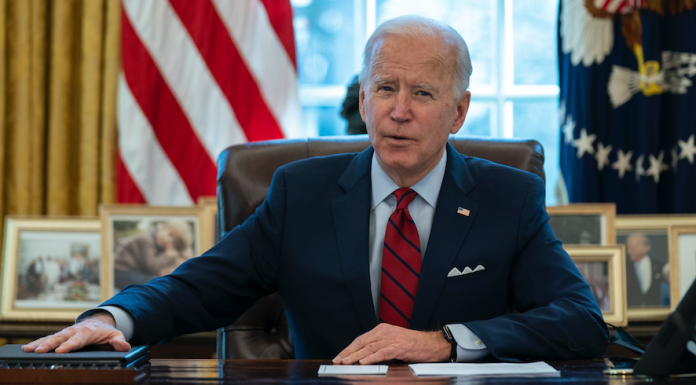(Brad Polumbo, Foundation for Economic Education) The Biden administration on Wednesday released a comprehensive $2+ trillion spending proposal ostensibly focused on infrastructure. But there’s much more to this plan than meets the eye.
A glance at the proposal reveals many items that appear only tenuously related to infrastructure. In fact, several don’t appear to be related to infrastructure at all.
Here are 9 of the most suspect items in Biden’s “infrastructure” proposal, taken directly from a fact-sheet on the plan the White House released.
1. $10 Billion to Create a ‘Civilian Climate Corp’
The Biden administration proposes spending $10 billion to create a “Civilian Climate Corp.” The White House claims that “This $10 billion investment will put a new, diverse generation of Americans to work conserving our public lands and waters, bolstering community resilience, and advancing environmental justice through a new Civilian Climate Corps.”
2. $20 Billion to ‘Advance Racial Equity and Environmental Justice’
The proposal sets aside a whopping $20 billion—more than the latest COVID package spent on vaccines—for “a new program that will reconnect neighborhoods cut off by historic investments and ensure new projects increase opportunity, advance racial equity and environmental justice, and promote affordable access.”
3. $175 Billion in Subsidies for Electric Vehicles
Electric vehicles: A technological novelty so good it won’t catch on without hundreds of billions in subsidies. At least, that’s apparently what the Biden administration thinks, as its infrastructure proposal earmarks a “$174 billion investment to win the electric vehicle market.”
The spending will take the form of manufacturing subsidies and consumer tax credits, which historically have benefitted wealthy families most. For comparison, the proposal carves out more for green energy goodies than it does on the total $115 billion to “modernize the bridges, highways, roads, and main streets that are in most critical need of repair.”
4. $213 Billion to Build/Retrofit 2 Million Houses & Buildings
When most people hear “infrastructure,” they think of roads, bridges, tunnels, and so on. But the Biden administration’s definition of the term is Olympian-gymnastics-level flexible. Apparently, the president considers it “infrastructure spending” to allocate $213 billion to build or retrofit 2 million “sustainable” houses and buildings. They also slip in $40 billion for public housing, stating this will “disproportionately benefit women, people of color, and people with disabilities.”
5. $100 Billion for New Public Schools and Making School Lunches ‘Greener’
You might remember that the last “COVID” legislation had $128.5 billion in taxpayer dole-outs for public schools; much of the money will be spent years after the pandemic and there was no requirement that schools actually open. Yet this was, evidently, just the beginning. The Biden “infrastructure” plan includes another “$100 billion to upgrade and build new public schools.”
“Funds also will be provided to improve our school kitchens, so they can be used to better prepare nutritious meals for our students and go green by reducing or eliminating the use of paper plates and other disposable materials,” the proposal reads. (Emphasis mine).
6. $12 Billion for Community Colleges
One generally thinks of infrastructure and higher education as separate, distinct sectors. Yet the Biden “infrastructure” plan slips in $12 billion for states to spend on community colleges.
7. Billions to Eliminate ‘Racial and Gender Inequities’ in STEM
The proposal includes several billion dollars allocated to reduce supposed “racial and gender inequities” in Science, Technology, Engineering, and Math (STEM) research and development.
What this has to do with interstate infrastructure is not adequately explained.
8. $100 Billion to Expand Broadband Internet (And Government Control of It)
Loosely lumped under the broad term “digital infrastructure,” the plan allocates $100 billion to “bring affordable, reliable, high-speed broadband to every American.” Interestingly, the proposal openly states that it wishes to promote government and NGO control of broadband and push out private sector providers: It “prioritizes support for broadband networks owned, operated by, or affiliated with local governments, non-profits, and co-operatives—providers with less pressure to turn profits.”
9. $25 Billion for Government Childcare Programs
The plan includes $25 billion “to help upgrade child care facilities and increase the supply of child care in areas that need it most.” According to the White House, “funding would be provided through a Child Care Growth and Innovation Fund for states to build a supply of infant and toddler care in high-need areas.”
Just Scratching the Surface
The above list totals hundreds of billions in waste and unrelated partisan spending slipped into the Biden administration’s expensive “infrastructure” plan. But it should be stressed that this list is far from exhaustive; it’s what one reporter was able to find in a few hours of research.
By the time this proposal is translated into hundreds of pages of legislation (if not thousands) and subjected to Congress’s (and lobbyists’) influence, there will no doubt be even more waste and partisan policies slipped into it.
Yes, there is serious debate about the state of American infrastructure and the proper role of the federal government in addressing its deficiencies. However, of this plan’s more than $2 trillion in proposed spending, just $621 billion goes to “transportation infrastructure and resilience.” That’s right, just roughly one-third of the money goes to the kinds of spending people would usually associate with infrastructure, like repairing roads and bridges and modernizing public transit.
Can Biden get away with this?
Well, remember that only 10 percent of the Biden administration’s $1.9 trillion in “COVID relief” spending was actually directly related to COVID-19, with much of it going to waste, politician pet projects, and partisan priorities. The president appears to have taken a similar approach to infrastructure spending.
Unfortunately, it’s not much of a surprise. As the American journalist and satirist PJ O’Rourke once said, “Giving money and power to government is like giving whiskey and car keys to teenage boys.”…Original Source…

